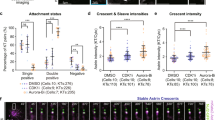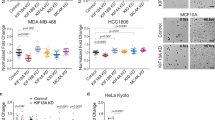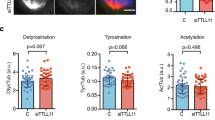Abstract
Most solid tumours are aneuploid and many frequently mis-segregate chromosomes. This chromosomal instability is commonly caused by persistent mal-oriented attachment of chromosomes to spindle microtubules. Chromosome segregation requires stable microtubule attachment at kinetochores, yet those attachments must be sufficiently dynamic to permit correction of mal-orientations. How this balance is achieved is unknown, and the permissible boundaries of attachment stability versus dynamics essential for genome stability remain poorly understood. Here we show that two microtubule-depolymerizing kinesins, Kif2b and MCAK, stimulate kinetochore–microtubule dynamics during distinct phases of mitosis to correct mal-orientations. Few-fold reductions in kinetochore–microtubule turnover, particularly in early mitosis, induce severe chromosome segregation defects. In addition, we show that stimulation of microtubule dynamics at kinetochores restores stability to chromosomally unstable tumour cell lines, establishing a causal relationship between deregulation of kinetochore–microtubule dynamics and chromosomal instability. Thus, temporal control of microtubule attachment to chromosomes during mitosis is central to genome stability in human cells.
This is a preview of subscription content, access via your institution
Access options
Subscribe to this journal
Receive 12 print issues and online access
$209.00 per year
only $17.42 per issue
Buy this article
- Purchase on Springer Link
- Instant access to full article PDF
Prices may be subject to local taxes which are calculated during checkout





Similar content being viewed by others
References
Lengauer, C., Kinzler, K.W. & Vogelstein, B. Genetic instabilities in human cancers. Nature 396, 643–649 (1998).
Storchova, Z. & Pellman, D. From polyploidy to aneuploidy, genome instability and cancer. Nature Rev. Mol. Cell Biol. 5, 45–54 (2004).
Lengauer, C., Kinzler, K.W. & Vogelstein, B. Genetic instability in colorectal cancer. Nature 386, 623–627 (1997).
Gao, C., et al. Chromosome instability, chromosome transcriptome, and clonal evolution of tumor cell populations. Proc. Natl Acad. Sci. USA. 104, 8995–9000 (2007).
Kuukasjarvi, T., et al. Genetic heterogeneity and clonal evolution underlying development of asynchronous metastasis in human breast cancer. Cancer Res. 57, 1597–1604 (1997).
Houlston, R. & Tomlinson, I. Association between chromosomal instability and prognosis in colorectal cancer: a meta-analysis. Gut 10.1136/gut.2007.135004 (2008).
Cheeseman, I.M. & Desai, A. Molecular architecture of the kinetochore-microtubule interface. Nature Rev. Mol. Cell Biol. 9, 33–46 (2008).
Loncarek, J., et al. The centromere geometry essential for keeping mitosis error free is controlled by spindle forces. Nature 450, 745–749 (2007).
Indjeian, V.B. & Murray, A.W. Budding yeast mitotic chromosomes have an intrinsic bias to biorient on the spindle. Curr. Biol. 17, 1837–1846 (2007).
McEwen, B.F., Heagle, A.B., Cassels, G.O., Buttle, K.F. & Rieder, C.L. Kinetochore fiber maturation in PtK1 cells and its implication for the mechanisms of chromosome congression and anaphase onset. J. Cell Biol. 137, 1567–1580 (1997).
Cimini, D. & Degrassi, F. Aneuploidy: a matter of bad connections. Trends Cell Biol. 15, 442–451 (2005).
Musacchio, A. & Salmon, E.D. The spindle-assembly checkpoint in space and time. Nat. Rev. Mol. Cell Biol. 8, 379–383 (2007).
Pinsky, B.A., Kung, C., Shokat, K.M. & Biggins, S. The Ipl-1-Aurora protein kinase activates the spindle checkpoint by creating unattached kinetochores. Nat. Cell Biol. 8, 78–83 (2006).
Cahill, D.P., et al. Mutations of mitotic checkpoint genes in human cancers. Nature 392, 300–303 (1998).
Barber, T.D., et al. Chromatid cohesion defects may underlie chromosome instability in human colorectal cancers. Proc. Natl Acad. Sci. USA 105, 3443–3448 (2008).
Thompson, S.L. & Compton, D.A. Examining the link between chromosomal instability and aneuploidy in human cells. J. Cell Biol. 180, 665–672 (2008).
Cimini, D., et al. Merotelic kinetochore orientation is a major mechanism of aneuploidy in mitotic mammalian tissue cells. J. Cell Biol. 153, 517–527 (2001).
Andrews, P.D., et al. Aurora B regulates MCAK at the mitotic centromere. Dev. Cell 6, 253–268 (2004).
Lan, W., et al. Aurora B phosphorylates centromeric MCAK and regulates its localization and microtubule depolymerization activity. Curr. Biol. 14, 273–286 (2004).
Knowlton, A.L., Lan, W. & Stukenberg, P.T. Aurora B is enriched at merotelic attachment sites, where it regulates MCAK. Curr. Biol. 16, 1705–1710 (2006).
Kline-Smith, S.L., Khodjakov, A., Hergert, P. & Walczak, C.E. Depletion of centromeric MCAK leads to chromosome congression and segregation defects due to improper kinetochore attachments. Mol. Biol. Cell 15, 1146–1159 (2004).
Maney, T., Hunter, A.W., Wagenbach, M. & Wordeman, L. Mitotic centromere-associated kinesin is important for anaphase chromosome segregation. J. Cell Biol. 142, 787–801 (1998).
Manning, A.L., et al. The kinesin-13 proteins Kif2a, Kif2b, and Kif2c/MCAK have distinct roles during mitosis in human cells. Mol. Biol. Cell 18, 2970–2979 (2007).
Cimini, D., Moree, B., Canmen, J.C. & Salmon, E.D. Merotelic kinetochore orientation occurs frequently during early mitosis in mammalian tissue cells and error correction is achieved by two different mechanisms. J. Cell Sci. 116, 4213–4225 (2003).
Lampson, M.A., Renduchitala, K., Khodjakov, A. & Kapoor, T.M. Correcting improper chromosome-spindle attachments during cell division. Nature Cell Biol. 6, 232–237 (2004).
Hauf, S., et al. The small molecule Hesperadin reveals a role for Aurora B in correcting kinetochore-microtubule attachment and in maintaining the spindle assembly checkpoint. J. Cell Biol. 161, 281–294 (2003).
Nicklas, R.B. & Ward, S.C. Elements of error correction in mitosis: microtubule capture, release, and tension. J. Cell Biol. 126, 1241–1253 (1994).
Cimini, D., Wan, X., Hirel, C.B. & Salmon, E.D. Aurora kinase promotes turnover of kinetochore microtubules to reduce chromosome segregation errors. Curr. Biol. 16, 1711–1718 (2006).
Zhai, Y., Kronebusch, P.J. & Borisy, G.G. Kinetochore microtubule dynamics and the metaphase-anaphase transition. J. Cell Biol. 131, 721–734 (1995).
DeLuca, J.G., et al. Kinetochore microtubule dynamics and attachment stability are regulated by Hec1. Cell 127, 969–982 (2006).
Fuller, B.G., et al. Midzone activation of aurora B in anaphase produces an intracellular phosphorylation gradient. Nature 453, 1132–1136 (2008).
Green, R.A. & Kaplan, K.B. Chromosome instability in colorectal tumor cells is associated with defects in microtubule plus-end attachments caused by dominant mutation of APC. J. Cell Biol. 163, 949–961 (2003).
Fodde, R., et al. Mutations in the APC tumor suppressor gene cause chromosomal instability. Nat. Cell Biol. 3, 433–438 (2001).
Rajagopalan, H., et al. Inactivation of hCDC4 can cause chromosomal instability. Nature 409, 355–359 (2001).
Joukov, V., et al. The BRCA1/BARD1 heterodimer modulates Ran-dependent mitotic spindle assembly. Cell 127, 539–552 (2006).
Cimini, D., Tanzarella, C. & Degrassi, F. Differences in malsegregation rates obtained by scoring ana-telophases or binucleate cells. Mutagenesis 14, 563–568 (1999).
Mack, G.J. & Compton, D.A. Analysis of mitotic microtubule-associated proteins using mass spectrometry identifies astrin, a spindle-associated protein. Proc. Natl Acad. Sci. USA 98, 14434–14439 (2001).
Ganem, N.J., Upton, K. & Compton, D.A. Efficient mitosis in human cells lacking poleward microtubule flux. Curr. Biol. 15, 1827–1832 (2005).
Ganem, N.J. & Compton, D.A. The KinI kinesin Kif2a is required for bipolar spindle assembly through a functional relationship with MCAK. J. Cell Biol. 166, 473–478 (2004).
Acknowledgements
We thank Linda Wordeman (University of Washington) for providing plasmids encoding GFP-tagged proteins, Tarun Kapoor for providing Hesperadin, and Kevin Sullivan for providing the CenpB–GFP U2OS cells. This work was supported by National Institutes of Health grants GM51542 to D.A.C. and GM008704 to S.L.T.
Author information
Authors and Affiliations
Contributions
All authors contributed to project planning and data analysis. S.F.B., S.L.T. and A.L.M. contributed to the experimental work.
Corresponding author
Ethics declarations
Competing interests
The authors declare no competing financial interests.
Supplementary information
Supplementary Information
Supplementary Information (PDF 985 kb)
Rights and permissions
About this article
Cite this article
Bakhoum, S., Thompson, S., Manning, A. et al. Genome stability is ensured by temporal control of kinetochore–microtubule dynamics. Nat Cell Biol 11, 27–35 (2009). https://doi.org/10.1038/ncb1809
Received:
Accepted:
Published:
Issue Date:
DOI: https://doi.org/10.1038/ncb1809
This article is cited by
-
Twenty years of merotelic kinetochore attachments: a historical perspective
Chromosome Research (2023)
-
Disentangling the roles of aneuploidy, chromosomal instability and tumour heterogeneity in developing resistance to cancer therapies
Chromosome Research (2023)
-
Development and validation of a vesicle-mediated transport-associated gene signature for predicting prognosis and immune therapy response in hepatocellular carcinoma
Journal of Cancer Research and Clinical Oncology (2023)
-
Phosphorylation of adducin-1 by TPX2 promotes interpolar microtubule homeostasis and precise chromosome segregation in mouse oocytes
Cell & Bioscience (2022)
-
Chromosomal instability in adult-type diffuse gliomas
Acta Neuropathologica Communications (2022)



